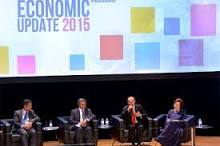School activity: Liow (right) with Eco World Foundation chairman Tan Sri Lee Lam Thye (with cap) and its CEO Capt (R) Datuk Liew Siong Sing (on Lee’s right) with students from SJK(C) Bukit Tinggi after Eco World handed over its donation of new canteen tables and benches to the school.
Liow: Retract UEC statement
BENTONG: MCA president Datuk Seri Liow Tiong Lai wants Deputy Education Minister Datuk P. Kamalanathan to retract his remarks about the Unified Examination Certificate (UEC).
He said Kamalanathan’s statement in Parliament that the Government’s refusal to recognise the UEC was due to issues of “national sovereignty” was never discussed in Cabinet meetings.
 Kamalanathan and Muhyiddin“I urge Kamalanathan to retract his statement. This has nothing to do with the sovereignty of the country.
Kamalanathan and Muhyiddin“I urge Kamalanathan to retract his statement. This has nothing to do with the sovereignty of the country.“This is his (Kamalanathan) personal view and not the Government’s. He may not have had the necessary information when he commented on the matter and this might mislead the public,” he said at SJK(C) Bukit Tinggi here after witnessing the handover of new canteen tables and benches yesterday.
Liow said if Kamalanathan did not understand the issue, he should have let Deputy Education Minister Chong Sin Woon explain it, adding that the statement might hurt the Chinese education system and the nation.
“The Education Ministry and the Higher Education Ministry have been in discussion over the recognition of the UEC,” he added.
Liow said the matter was discussed by the Malaysian Chinese Education Consultative Council Committee, comprising the United Chinese School Committees Association (Dong Zong), United Chinese School Teachers’ Association (Jia Zong) and Federation of Chinese Associations (Hua Zong), among others.
Responding yesterday, Kamalanathan maintained that his answer in Parliament was based on a Cabinet decision and not his personal view. His parliamentary reply was “verbatim” as per the Cabinet meeting on the matter on Nov 6 last year, he added.
However, he said it did not mean that it was impossible for UEC to be recognised.
“We (Education Ministry) have never closed the door on discussing (such) matters with any organisation because it is the ministry’s and everyone’s hope to see an improvement in the quality of our national education,” he said.
In KOTA KINABALU, Liberal Democratic Party president Datuk Teo Chee Kang said he was puzzled by Kamalanathan’s remarks in Parliament linking recognition of the UEC to national sovereignty.
“I regret that in answering a question in Parliament, the Deputy Minister said that the Government will not recognise the UEC for reasons of national interest and sovereignty.
“I wonder whether he knew what he was talking about. I cannot understand how it is related to national sovereignty,” he added.
- The Star/Asia News Network
Related posts:
May 17, 2014 ... Education Minister II Datuk Seri Idris Jusoh has admitted that Malaysia's
education system was below par as shown in global rankings, and ...
May 20, 2015 ... The bleak and bright side of Malaysian Education Malaysia may be getting
dismal marks for education but there are dedicated people making a ...


 Oct 12, 2014 ... Chinese language advantage and education in M'sia; Don't turn it into a political
tool! It is bewildering that vernacular schools should be made ...
Oct 12, 2014 ... Chinese language advantage and education in M'sia; Don't turn it into a political
tool! It is bewildering that vernacular schools should be made ...
Sep 22, 2015 ... “As discussed earlier (in the forum) by Minister in the Prime Minister's Department
Datuk Seri Abdul Wahid Omar on the education system here, ...
Nov 7, 2011 ... Our education system is heavily politicised and needs to be de-politicised to offer
good, simple and advancing education for all citizens – one ...
Jul 25, 2013 ... This has a lot to do with the education system and politics of the day. ... and open-
minded citizens are the result of a balanced education system ...
Dec 17, 2013 ... Still, they are indicative of education trends in China and elsewhere in Asia —
societies where test results determine entrance into prestigious ...







